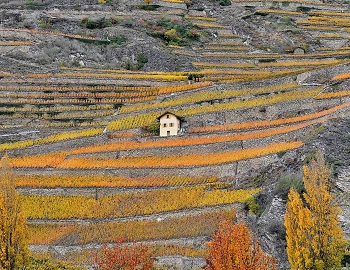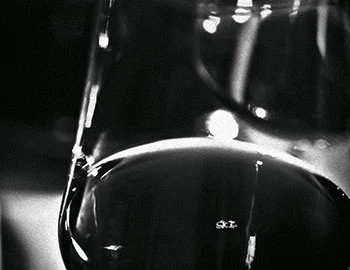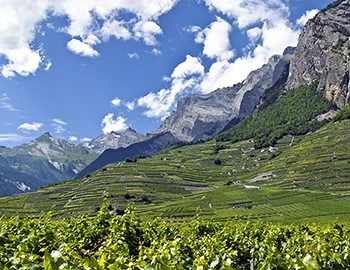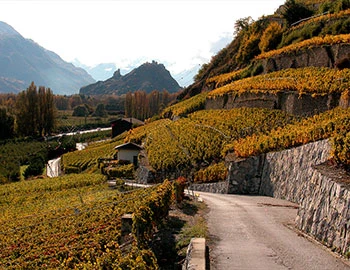Clos des Corbassières Humagne Rouge Coeur du Clos 2023
Clos des Corbassières Humagne Rouge Coeur du Clos 2023
AOC Valais, Domaine Cornulus, 750 ml

Description
The old vines of the Cœur du Clos give this typical Valais grape variety its noble character. Aged for 18 months in new oak barrels, this wine develops impressive aromas with great finesse. Soft, spicy, with fine tannins and a complex finish.
Attributes
| Grape variety: | Humagne rouge |
| Producer: | Domaine Cornulus |
| Origin: | Switzerland / Wallis |
| Other vintages: | 2022 |
| Ripening potential: | 2 to 7 years |
| Drinking temperature: | 16 to 18 °C |
| Food Pairing: | Moroccan specialities, Cold fish dish, dried meat, Meat terrine, Saddle of lamb fillet with herb jus |
| Volume: | 14.0 % |
| Note: | Contains sulphites |
Domaine Cornulus
What started out from humble beginnings over 20 years ago is now one of Valais’ flagship wineries and the byword for both a way of working in harmony with nature and premium wines, all of which strongly bring out their individual terroir.
Valais natives and cousins Stéphane Reynard and Dany Varone are perfectionists who love what they do. They tend to their vines, which live and thrive above Sion in the village of Savièse, as if they were their own children. Thanks to Dany Varone’s meticulous and expert work in the wine cellar, they craft terroir wines of the highest quality. This winemaking duo – now part of the Valais elite – laid the foundation for their successful Domaine Cornulus project in 1986, setting up the “Buteo” wine cellar and launching their “Garage Winery”. They bought their first harvests straight off the vines of various Savièse winegrowers and started pressing them in a garage. The following year, they leased their first vines in the vineyards above Sion (less than 1 hectare). In 1989 they created the Sélection Cornulus, after which their winery is named. A few harvests later, they acquired their first plots in the Clos de Mangold in 1995. Their dream of establishing a real domaine of their own gradually took shape. “After all, you will rarely find a good wine without terroir,” say Stéphane and Dany. In 1999 there followed the “prime cut”, the famous Clos des Corbassières, the jewel in the domaine’s crown. In the course of the “noughties”, they successively acquired various Grand Cru plots between Sion and Sierre as well as Clos Chamaray, St-Charles and La Follie. The rich palette of exquisite vines was finally rounded off to perfection by the magnificent Clos des Monzuettes.

Humagne rouge
Wild wine
With this wine, you have a choice. Either drink it young, when its lush berry fruit dominates, or wait three to five years and experience its wild side. Even when young the Humagne rouge demonstrates echoes of tree bark and animal hide. These aromas truly come into their own with maturation. They are joined by hints of smoke, brushwood and pepper. The question of where it fits seems almost unnecessary: in the wild, of course. Its origins are confusing. The Humagne grape variety should have actually been called Cornalin. It is identical to the Cornalin from the Italian Aosta Valley. Another Valais grape – the Rouge du Pays – was erroneously named after this, which in turn operates mostly as Cornalin. Thus they are both falsely named.

Wallis
Valais: Alpine wines with class
More than 20 varieties of grapes can yield wines in Valais that are full of character. A large number of them grow on spectacular, steep slopes. Sealed off by mighty chains of mountains, old plantings like Petite Arvine, Amigne and Cornalin have survived in Valais, and today they are highly sought-after by wine enthusiasts. The highest vineyards in Europe are also found in Valais: the Savignin vines (known here as “Heida”), rooted in the mountain community of Visperterminen.

Switzerland
Switzerland – A small country with enormous diversity
Switzerland is famous for its banks, watches, and cheese, but not necessarily for its wine. The Swiss didn't invent wine, but they have been extremely open and curious to it. Wine culture arrived in what is now modern Switzerland via several routes: from Marseilles to Lake Geneva and the Lower Valais region; from the Aosta Valley through the Great St. Bernard Pass to the rest of Valais; from the Rhone through Burgundy, across the Jura Mountains to Lake Constance; and from Lombardy to Ticino, and then on to Grisons.



